- Home
- Tanya Huff
The Heart of Valor Page 10
The Heart of Valor Read online
Page 10
“Staff Sergeant!”
There was a distinct snap in the major’s voice, Torin noted with amusement. It seemed a good DI threw all ranks back to basic.
“Sir, you will disembark when landing site is called secure.”
“Roger, Staff!” He reached into an upper vest pocket and pulled out a gray plastic wafer about a centimeter square. “Doc,” he said, pressing it onto her forehead with the ball of his thumb, “this is for you. Don’t worry about losing it; you’ll need a special solvent to get it off. I want you tight to my left side,” he continued as Dr. Sloan ran her fingers over the observer’s chit. “As long as you can keep up, we’ll leave you to move on your own.”
“As long as I can . . . And if I can’t?” she demanded.
In answer, he looked over her head. “Gunny?”
Torin tightened her chin strap. “Not a problem, sir.”
“What?” Dr. Sloan’s attention jerked back and forth between them. “She’ll carry me?”
“She’ll carry you.”
“It won’t be necessary.”
He nodded. “Good. Gunny, you’re on our six.”
“Yes, sir.”
The lights in the troop compartment flashed. “Dirtside. No enemy sighted!”
“Release!”
Torin was on her feet and into her pack before Dr. Sloan got clear of her webbing.
“71, go! Go! Go!”
With the sound of thirty-plus pairs of boots slamming against the deck ringing in her ears, Torin hung her KC-7 around her neck, grabbed the doctor’s shoulder, and turned her so that she was facing the major. With her other hand, she hauled her pack off the rack. “Give me your arms!”
Dr. Sloan thrust her arms back, and Torin slid the straps up them into the major’s grip. He settled the pack and, still holding the straps, started moving the doctor toward the door.
“Secure!”
Torin hit the dirt on the doctor’s heels, heard the door close behind her, and raced for the trees where the platoon had gone to ground. She was pleased to see that Dr. Sloan was right at the major’s side as they passed the fireteams holding a defensive position at the edge of the woods. Safely inside the perimeter, the major stopped running and put out one hand to catch the doctor. Torin spun around in time to see the VTA scream out of sight. Her helmet scanner registered only empty landscape; she knew the scenario had no attack planned until the morning of day two but she kept her weapon up and ready until Staff Sergeant Behyn gave the all clear.
They’d landed in a field, open but for a few scrawny leafless trees, some clumps of thorn bush, and a scattering of small evergreens—half a dozen of them crushed by the weight of the VTA. Golden spears of dead grass stabbed up through the eight centimeters or so of hard snow, and the dark gray clouds over the trees to the south promised more snow to come.
From where she stood, in mixed deciduous forest 19.5 meters from the landing site, Torin’s scanner put a similar forest 2.2 kilometers to the east, 233.7 meters to the south, and 167.2 meters to the west of the clearing.
“The pilot said the landing site was clear.” Dr. Sloan slumped back against a tree, yanked off her toque, and used it to fan her face. “Why the mad dash for cover?”
“If they know we’re incoming,” Torin told her quietly, “the Others occasionally hide snipers under an electronic camouflage the scanners don’t always penetrate.”
“Don’t always penetrate?” The doctor’s brows rose. “But sometimes they do? So these snipers sit out here . . . there . . . and risk being spotted and killed from the air. Why would anyone do that?”
“Because sometimes it works.” Confederation forces occasionally did the same thing. For the same reason. “About a third of all Crucible scenarios used to include an immediate attack upon landing, but Command deleted that from the programming about eight years ago. Too many VTAs were taking damage.”
Dr. Sloan pulled off a mitten and touched her observer’s chit. “Couldn’t Crucible be programmed to miss the VTAs?”
“They weren’t taking hits from Crucible, ma’am.”
It didn’t take her long to work it out. “Oh, wonderful,” she sighed. “Here I am in the woods with a group of barely trained Marines who, precedent suggests, would be likely to shoot at their own transport if under attack. Tell me that my little bit of plastic will protect me from them, too.”
“Sorry, ma’am. You’re under the same danger from friendly fire as the rest of us.”
“What’s friendly about it?” she demanded pulling mitten and toque back on as she cooled down from the run.
“Not much,” Torin admitted as the major rejoined them.
She stared at the major’s combats, then at Torin’s, then at the rest of the platoon. On board ship, they’d been mottled gray, urban camouflage; here they were white with pale shadows zigzagging across them. “Chameleon fabric?”
“Within certain very limited parameters, yes.” Major Svensson grinned at her. “You stand out a bit, Doc.”
“It doesn’t matter,” Torin explained hurriedly as the doctor sighed and began unfastening her bright blue coat. “The system only sees the chit, and it’s best to give this lot as few opportunities for mistaken identity as possible.”
“So this isn’t why you mentioned my coat on the VTA?”
“No, ma’am. If I thought you’d be safer without it, I’d have said exactly that.”
She zipped up and shot the major an exasperated look. “Forewarned, Major. I have laxatives with me and I will use them if you keep yanking my chain.”
Squad One, Team One had been assigned the first scout position. When one/one gave the all clear, a kilometer northwest of the landing site, Staff Sergeant Beyhn put the remainder of the platoon into a narrow diamond pattern, tucked his three extra personnel into the center, and gave the order to move out. Torin thought his warnings to be careful went just a little over the top, but on reflection she realized that perhaps she’d gotten too used to Marines who’d been blooded and who, in turn, had done some damage of their own.
The woods were quiet, the sounds of thirty-six Marines and one doctor almost completely muffled by the snow. In the summer, the underbrush would have dragged at feet and equipment, masking poor footing, but most of it had died back and what hadn’t was leafless and easy to get through. The few evergreens were low and avoidable. The walking wasn’t quite as easy as it would have been out in the open, but it was close. With scanners preset to Crucible’s true north and 337 degrees keyed in, it was impossible to go off course; a minor deviation showed as a red line, anything more than five degrees sounded alarms. Late in the scenario, Torin knew the scanners would be taken out by a particularly nasty piece of programming used by the Others on Arim’s Moon and reverse engineered by Corps R&D. The recruits would be dependent on the equipment between their ears instead of on their heads so, given that their heads were still cluttered up with the kind of preconceptions that would kill in a combat situation, Torin had every intention of enjoying the certainty of tech while she had it.
* * *
“Looks like we’re about to run out of woods.”
Kichar signaled for quiet and indicated they should remain in place while she went forward to have a look. Tucked behind the largest of the remaining trees, she peered out across a clearing her scanner marked as 827.3 meters and, also, completely empty. Scanners could be fooled. Carefully moving out into the transitional growth, she swept her gaze left to right, marking a disturbance in the snow at about twenty-two degrees, three meters east, and visually confirming her scanner’s data.
No enemy in sight.
“All right . . .” Hours of practice alone on her bunk put her voice just over the edge of her PCU’s ability to read. “. . . come on up.”
The rest of her team approached a lot less quietly, but then, she’d told them it was safe.
“We’re not going to get around that,” Sakur noted, leaning out far enough to see that the clearing was actually an extended east w
est break in the trees. “We’ll have to cross.”
“Two by two, double-time; covered from the trees first on this side . . .” Hisht waved across the open ground. “. . . then from over there.”
She nodded. “Last one sweeps the trail in case the Others have air support and do a flyover.”
Sakur snorted. “That’s a little paranoid.”
“We’re supposed to be paranoid.”
“We gonna check out the tracks?” Lynne Bonninski, the fourth member of the team and currently carrying the KC-9, shifted her grip on her weapon. “Because I’d just as soon not double any farther than I had to.”
“Hisht and I will detour to check them out on our cross. You and Sakur take the shortest points. Sakur, you . . .”
“Sweep, yeah, I got it. With what?”
“This.” Nose ridges nearly shut in the cold air, Hisht reached down and snapped a branch off a sprawling evergreen.
“You didn’t scan that, did you?” Kichar sighed. “You have no idea if it’s poisonous.”
“Isn’t.” Proving his point, Hisht shoved the collar of his bodysuit down and bit the end off a branch. “Prickly, though,” he added after chewing a couple of times.
“But you’re handing it to a di’Taykan, not another Krai, and he’s not wearing gloves under mittens.”
“I’ve scanned, I’m good.” Sakur snapped his slate back in place and took the branch. “But you’d better move before you have to ping group and tell Staff Sergeant Beyhn there’s been a delay. You don’t want him crawling up your butt.”
Since she couldn’t argue with that—the staff sergeant had been very clear about no contact unless the body of the platoon had to be warned about the route. “Hisht.”
“I come.”
Her stride longer, she reached the tracks seconds before Hisht and stared down at them, hoping for some kind of insight into the species who had made them. “They look like . . .”
“Cloven hooves,” the Krai announced, catching up.
“Not Others, then. At least not Others we know.”
“Not Others. Look.” He pointed at a cleared bit of earth. “There they scrape the snow away to get at grass. Grass eaters. Chrick.”
“What don’t you consider edible?” Kichar wondered as they started moving again.
“Rocks. Most rocks,” he amended thoughtfully as they reached the trees.
“Of course,” Bonninski muttered a few moments later, “we had to follow your tracks, or the mad sweeper here couldn’t delete them, could he?”
Kichar felt her cheeks flush. “I never . . .”
“Nice to know all those times the Staff gave me cleanup duties paid off,” Sakur declared as he backed under cover and tossed the branch away. “I have completely obliterated any chance of us being identified by our footprints. What?” He looked from Human to Human, then grinned. “Ah, Bonbon mentioned your fuk-up. Good on you. You need more of them.”
“Fuk-ups can get Marines killed,” Kichar growled. “Tag and let’s move out.” She didn’t bother waiting to make sure he’d thumbed the marker onto one of the trees at the edge of the clearing. Sakur might be an annoying pain in the ass, but he did his job—which was more than could be said for her right now. Stupid. Stupid. Stupid. Gunnery Sergeant Kerr would have never missed anything so obvious. She’d just have to try harder.
* * *
After checking for the scouts’ tag, the bulk of the platoon double-timed across the clearing in four lines, recruits of three/three sweeping away identifiable footprints. If the Others did happen to stumble over their tracks, they’d have no way of knowing how many Marines were dirtside. The scenario knew exactly how many, of course—not only were they under constant satellite surveillance but their stats had been programmed into the sector so that any injuries severe enough to set off a med-alert would immediately ping the OP.
Setting the recruits to sweeping, therefore, had no intrinsic use particularly since in this part of the scenario Crucible had no air support. The ability to keep this kind of information to themselves more than anything convinced Torin she’d never make it as a DI—she’d have the whole platoon moving slick and sloppy, trying to throw the system off by getting them to an unexpected camp and then, in case that didn’t work, setting up an ambush for the scenario’s attack. Winning quickly and decisively meant fewer casualties.
“What is that?”
Torin followed the doctor’s pointing finger and, pulling off her mitten, scooped a dark brown pellet about a centimeter in diameter out of a small pile. “Herbivore shit,” she said, squashing it between thumb and forefinger as she walked. “Not that old either. It wasn’t quite frozen through.”
“You’re a woman of many talents, Gunny.”
“I grew up on a farm. You shovel enough shit, you remember things about it.” She tossed it away, rubbed her fingers on her leg and frowned as once again a mitten rose to rub against the chit on Dr. Sloan’s forehead. “Is that bothering you?”
“No. Yes. It’s just a little obvious.”
“It’s supposed to be,” Major Svensson interjected from her other side. “It’s to keep you from getting shot. It can be read from under your clothing, but I’d rather not take the chance that the signal might be blocked.”
“And I appreciate that.”
But Torin noticed she continued to rub at it every now and then.
After an hour and forty minutes of walking, they caught up to the scout team at the east end of a narrow lake where they already had a hole through the ice and their spare canteens filled. After confirming their new azimuth with Staff Sergeant Beyhn, they started out again while the rest of the platoon dropped packs and topped up their water supplies.
“Are you sure this is safe?” Dr. Sloan asked, sliding her backpack down her arms and arching her back. “There are alien microbes in that water, after all.”
“Any microbe that can survive the purifying process inside our canteens deserves to have a chance at the inside of a Marine.”
“These canteens can take pretty much any liquid with more hydrogen than oxygen in it and turn it into water,” Torin explained, tightening the lid as Dr. Sloan shot the major an exasperated look. “It’s the same tech as in our HE suits, so purifying actual water is fairly rudimentary.”
“Still, if we need water, we’re surrounded by snow. Wouldn’t that be cleaner?”
“Takes energy to turn snow to water,” Major Svensson told her as they walked off the lake. “We’ll use it if we have to, but . . .”
Torin missed everything after the but as she headed over to Staff Sergeant Beyhn. Standing where he could see the lake and both trails, his cheeks were flushed a deep red and, based on the flicker of water vapor by his face, he was breathing heavily. When she got close enough, she saw that the ends of his hair were in constant motion under the edge of his helmet. Trouble was, they weren’t moving in unison.
When di’Taykan hair grew that agitated, the di’Taykan in question was laboring under some strong emotion.
She considered and discarded a number of tactful ways to find out what she needed to know and finally figured, screw it; they had thirty-six recruits humping packs across a frozen landscape assuming every moment they were going to come under fire. This was no time for good manners.
“You okay? You look like shit.”
“This is my last group.” He turned pale eyes on her, glare off the snow shutting down most of his light receptors. “My last set of recruits. Once I get them through, once I know they’re safe, I can go home.”
Ah. “You’re going to retire?”
She couldn’t read his expression. “It’s time.”
“You’re not sick?”
“Me?” His posture changed subtly, any softness, any uncertainty disappearing. “I have never felt better, Gunny, and I plan to run your major’s ass ragged from here to the pickup point.”
“Glad to hear it, Staff. He needs the workout. Oh, and . . .” She shifted her weight as she recognize
d her body’s reaction. “. . . you might want to turn up your masker. Even at this temperature, you’re a little potent.”
Hand to his throat, he flashed a strangely triumphant grin and strode toward the ice. “Back in position, 71! We’re not gathered here for Mon gleen; get ready to move out!”
Feeling the pinprick of someone’s regard between her shoulder blades, Torin pivoted on one heel and caught Jonin’s gaze before he looked away. A gesture held him in place and, after a quick glance to ensure the staff sergeant was still out on the ice, she walked quickly to his side.
“What’s wrong with him?”
“You’re not a di’Taykan, Gunnery Sergeant.”
“Tell me something I don’t know, Recruit. What’s up with the staff sergeant?”
“I’m very sorry, but I’m not able to tell you.”
He looked miserable but not as miserable as he was going to look if he kept crucial information from her. “Why not?”
“Because the information concerns the di’Taykan as a people, not the Corps. If I told you, and the other di’Taykan in the platoon discovered that I had acted in such a culturally insensitive manner, then they would . . .” He sighed. “Actually, they wouldn’t.”
“Wouldn’t?” Torin felt both her brows rise in unfeigned astonishment. If di’Taykan didn’t bother defining a physical activity, they could only be referring to one thing. If Jonin discussed the staff sergeant’s problem, they wouldn’t? Critical injuries barely stopped the di’Taykan. This was big. “If it affects the Corps, Recruit, it’s no longer a di’Taykan matter.”
“I’m aware of that, Gunnery Sergeant Kerr. If it becomes a Corps matter, I promise I’ll come to you. I should never have said anything on the ship.”
“Too late now.”
Jonin shrugged, the gesture elegantly saying in spite of combats and pack: We all make mistakes.
Torin watched him a moment longer and was impressed in spite of herself by the way he met her eyes. “Go on,” she said at last, jerking her chin toward the rest of the platoon, “your fireteam’s forming up.” As he doubled across the snow, she wondered if the other di’Taykan in the platoon had given him trouble after he’d come to her. Probably not. In the Taykan class system, di’Arl Jonin, with a three-letter family name, socially outranked the rest and since that wasn’t a reaction that ever completely vanished, even from Marines with significantly more experience, these recruits would be unlikely to buck the system.

 Child of the Grove
Child of the Grove Blood Lines
Blood Lines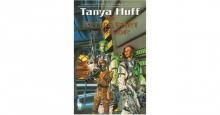 What Manner of Man
What Manner of Man Blood Pact
Blood Pact Blood Debt
Blood Debt The Wild Ways
The Wild Ways Blood Trail
Blood Trail Blood Shot
Blood Shot Wizard of the Grove
Wizard of the Grove Valor's Trial
Valor's Trial The Privilege of Peace
The Privilege of Peace A Peace Divided
A Peace Divided Three Quarters
Three Quarters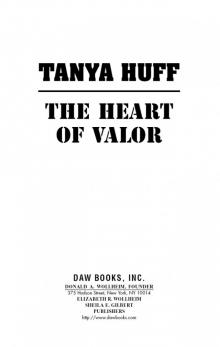 The Heart of Valor
The Heart of Valor No Quarter
No Quarter The Demon's Den and Other Tales of Valdemar
The Demon's Den and Other Tales of Valdemar Enchantment Emporium
Enchantment Emporium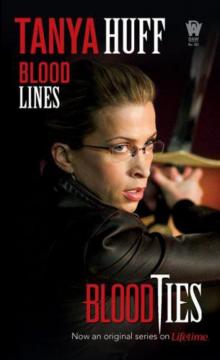 3 Blood Lines
3 Blood Lines The Heart of Valour
The Heart of Valour Smoke and Ashes
Smoke and Ashes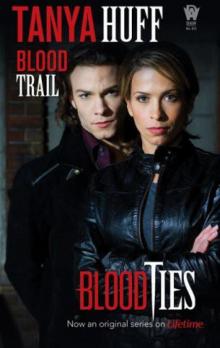 2 Blood Trail
2 Blood Trail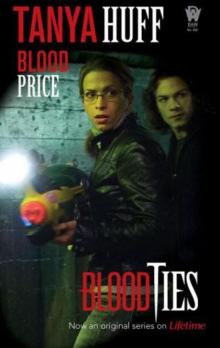 1 Blood Price
1 Blood Price Summon the Keeper
Summon the Keeper The Future Falls
The Future Falls Third Time Lucky: And Other Stories of the Most Powerful Wizard in the World
Third Time Lucky: And Other Stories of the Most Powerful Wizard in the World The Second Summoning
The Second Summoning Fifth Quarter
Fifth Quarter The Enchantment Emporium
The Enchantment Emporium An Ancient Peace
An Ancient Peace Blood Bank
Blood Bank February Thaw
February Thaw The Better Part of Valour
The Better Part of Valour The Silvered
The Silvered Valour's Choice
Valour's Choice Smoke and Shadows
Smoke and Shadows Sing the Four Quarters
Sing the Four Quarters 4 Blood Pact
4 Blood Pact Long Hot Summoning
Long Hot Summoning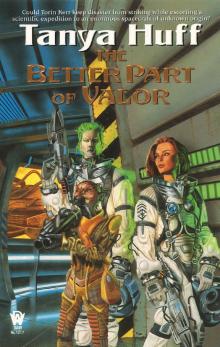 The Better Part of Valor
The Better Part of Valor Scholar of Decay
Scholar of Decay He Said, Sidhe Said
He Said, Sidhe Said Wild Ways
Wild Ways Gate of Darkness, Circle of Light
Gate of Darkness, Circle of Light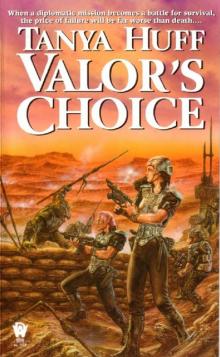 Valor's Choice
Valor's Choice Swan's Braid and Other Tales of Terizan
Swan's Braid and Other Tales of Terizan